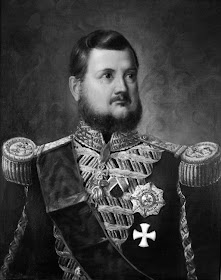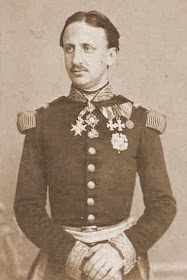Today I finished reading Harold Acton's splendid two volumes The Bourbons of Naples and The Last Bourbons of Naples, which gives ahistory of the dynasty who ruled the Kingdom of Naples and Sicily, later the United Kingdom of The Two Sicilies, from 1734 until its annexation by the Piedmontese in 1860-61.
As books they are immensely readable, full of characters and anecdotes, pervaded by a wide and humane sympathy for all things southern Italian, and, in contrast to previous studies in English ( or largely in Italian ), essentially favourable to the Bourbons. Acton was not blind to their failings, but neither is he blind to the failings of the opponants of the dynasty, and is fair minded in his account.

King Ferdinand I
As King Ferdinand IV and III of Naples and Sicily he ruled from 1759, and became the first King of the Two Sicilies in 1816 and died in 1825
Image: Mad Monarchist
As a family they were a strange mixture of the prosaic, if not bucolic, amongst the men and in the case of their wives heroic if flawed like Queen Maria Carolina ( sister of Queen Marie Antoinette, and always ready to remind anyone that she was the daughter of the Empress Maria Theresa) and Queen Maria Sophia ( sister of the Empress Elisabeth and who lived on until 1925), or a beatus like Queen Maria Christina ( ironically Savoyard by family).

King Ferdinand II
King from 1830-1859 he was much maligned by opponants of his rule
Image: Mad Monarchist
As rulers the Bourbon Kings could usually rely upon the loyalty of the masses, however inchoate, but the problem lay with the aristocracy and what might be expected to be the political class of the realm. Here there seems to have been a feckless, self-serving, dilettante culture more often than not throughout the period amongst those to whom both the monarch and the masses might have expected to provide political leadership and ability, let alone statesmanship. Though not entirely lacking in gifted administrators the kingdom appears often to be serendipitous in its ways, and the cause of concern to friends, such as Lord Nelson and Prince Metternich, and of temptation to rivals and dissidents. You sense something familiar of modern Italian political culture as you turn the pages of the volumes.
As a political unit, despite mid-Victorian English enthusiasm for the Risorgimento, it is possible to see that Bourbon naples and Sicily enjoyed a civilised, if sometimes eccentric, lifestyle and was in many ways much more advanced than its later detractors would have one believe; it was, for example, the first Italian state to have a railway.

King Francis II
King from 1859 he went into exile in 1861 and died in 1894
Image: Mad Monarchist
These are two very enjoyable books, and a source of both information and insight and also of entertainment and diversion - rather like Il Regno itself.

Arms of the Kingdom of The Two Sicilies
Image:Wikipedia

No comments:
Post a Comment